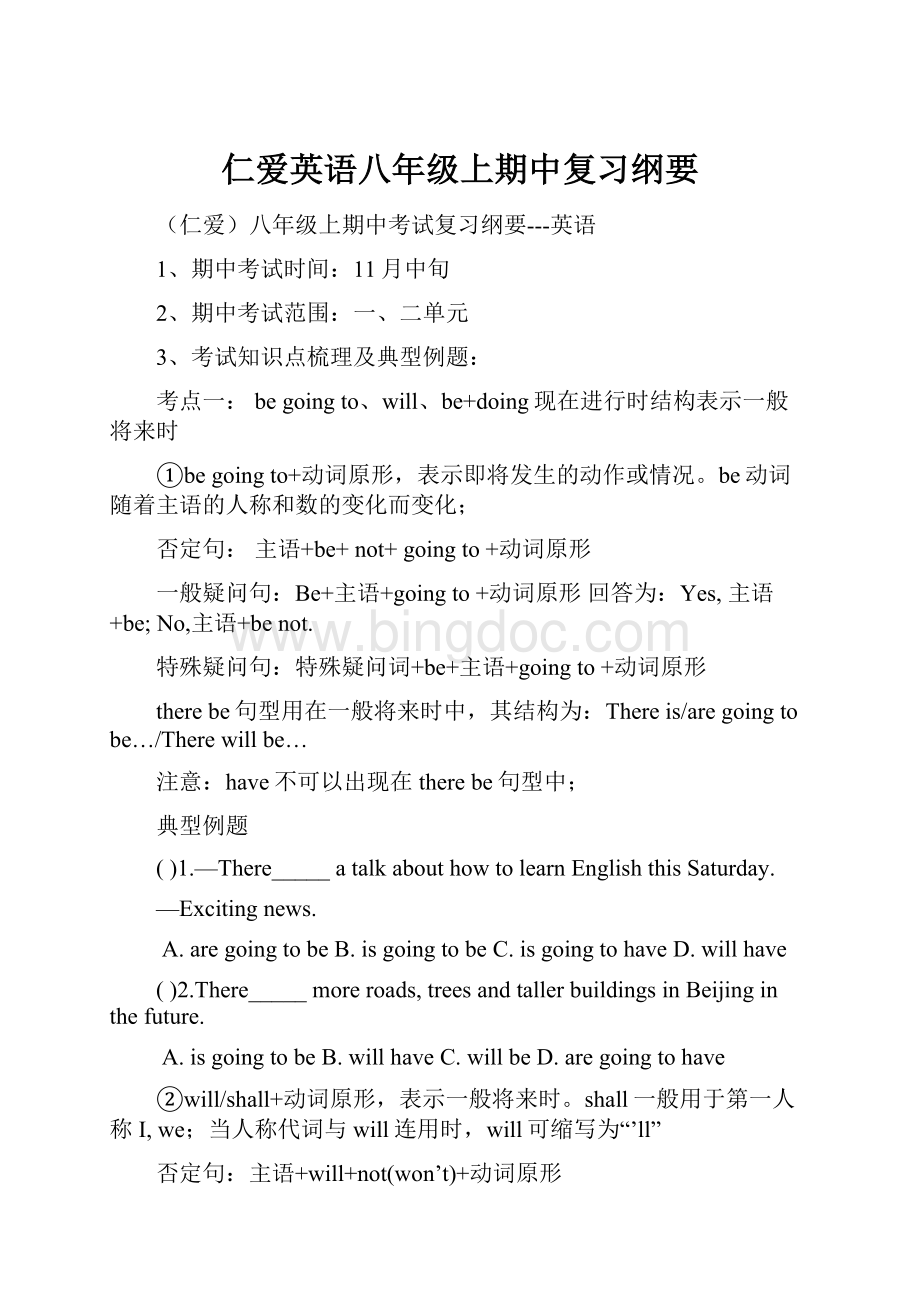仁爱英语八年级上期中复习纲要Word下载.docx
《仁爱英语八年级上期中复习纲要Word下载.docx》由会员分享,可在线阅读,更多相关《仁爱英语八年级上期中复习纲要Word下载.docx(14页珍藏版)》请在冰点文库上搜索。

当人称代词与will连用时,will可缩写为“’ll”
主语+will+not(won’t)+动词原形
Will+主语+动词原形回答:
Yes,主语+will;
No,主语+won’t.
特殊疑问词+will+主语+动词原形
一般用shall提问的时候,不用shall回答
()1.—ShallItakemycameraforthepicnic?
—______.It’llbefun.
A.Goodidea!
B.I’dlovetoC.I’msorrytohearthatD.Thanks.
()2.—There_____abasketballgamebetweenourclassandClassFivethisafternoon.Wouldyouliketocheerusonwithme?
—Yes,I’dloveto.
A.haveB.willbeC.willhaveD.aregoingto
③主语+bedoing,可以用现在进行时表示将来要发生的事,能用于这种情况的动词多是一些表示位置转移的词,例如leave,come,go,arrive,fly等,都可用现在进行时表示将来;
()1.LiPing______theUSAthedayaftertomorrowwithherparents.
A.leavestoB.lefttoC.isleavingforD.leavesfor
()2.Mysister_____Beijingtomorrow.Sheworksthere.
A.leavesB.isleavingforC.leavesforD.isleaving
考点二:
:
主语+谓语动词+间接宾语+直接宾语(Unit1Topic2)
在英语中,有些及物动词可以跟两个宾语,一个叫间接宾语,一个叫直接宾语,物作直接宾语,人作间接宾语;
主语+谓语+间接宾语(人)+直接宾语(物)
=主语+谓语+直接宾语(物)+介词+间接宾语(人)
常见的能跟双宾语的动词有:
pass,kick,bring,throw,buy,lend等
kicksb.sth.=kicksth.tosb.passsb.sth.=passsth.tosb.
buysb.sth.=buysth.forsb.
1.Pleasepassmethebook!
(改为同义句)
Pleasepassthebook____________.
考点三:
情态动词的用法(Unit2Topic1,2,3)
情态动词后接动词原形,没有人称时态和数的变化;
否定形式直接+not;
should/shouldn’t+动词原形,意为“应该/不应该……”,表示现在或将来的义务和责任,也用来表示劝告,提出建议等
hadbetter/hadbetternot+动词原形,意为“最好/最好不要……”,表示对别人的劝告,建议或表示一种愿望。
had常缩写为’d,没有人称和时态变化;
You’dbetternotreadinthesun.你最好不要在阳光下读书;
must+动词原形,意为“必须,一定要”,表示说话人的意志和义务或说话人强烈的的要求和命令;
must的否定形式为mustn’t,表示“不应该,不准,禁止”;
一般疑问句,将must提前至主语,肯定回答用must,否定回答用neen’t或don’thaveto;
—MustIgonow?
我现在必须走吗?
—Yes,youmust./No,youneedn’t/don’thaveto.是的,你必须走。
/不,你不必;
can/may+动词原形
can表示能力,意为“能,会”,可与beableto互换;
表示允许,意为“可以,能够”,在口语中代替may;
Can/MayIborrowyourpen?
我可以借一下你的笔吗?
表示“可能性”,常用于否定句或疑问句
Canitbetrue?
那会是真的吗?
may,意为“可以”,表示允许或征询对方的许可;
在回答may引导的疑问句时,肯定回答用Yes,youmay;
否定回答用No,youmustn’t./No,youcan’t.
haveto+动词原形,意为“不得不,必须”,have有has,have,had三种变形;
主语+don’t/doesn’t/didn’thaveto+动词原形
Do/Does/Did+主语+haveto+动词原形
肯定回答:
Yes,youdo. 否定回答:
No,youdon’t.
典型例题:
()1.—MustIreturnthebooktomorrowmorning?
—No,you_____.You_____keepitforthreedays.
A.mustn’t;
mayB.mustn’t;
mustC.needn’t;
canD.needn’t;
must
()2.She_____knowtheanswer,butI’mnotsure.
A.needB.
hastoC.
mayD.
must
()3.—I’msorryIbrokethewindow.
—You____playfootballnearthewindow.
A.shouldB.shouldn’tC.hadbetterD.must
()4.—MayIuseyourpen?
—Sure,______.
A.mypleasureB.I’mafraidnotC.goaheadD.that’sOK.
()5.—MustItalkwithmyfather,Mum?
—No,______.Heisbusynow.
A.youcan’tB.youdon’thavetoC.mustn’tD.havenotto
()6.—MustIfinishmyhomeworkbeforeIgohome?
—No,you_____.Butyou_____finishitbeforetomorrowafternoon.
A.mustn’t;
mustB.must;
mustn’tC.needn’t;
mustD.needn’t;
mustn’t
考点四:
takepartin,joinin和join(Unit1Topic1)
三者都有“参加”的意思,但是用法不同:
join表示加入某人,或者加入某一组织,例如army(军队),party(党派),club(俱乐部)等;
takepartin/joinin表示参加某项活动,例如game(比赛),sportsmeet(运动会)等
()1.—Whatareyougoingtodointhesportsmeet?
—I’mgoingto______thehighjump.
A.joinB.takepartinC.beD.takepart
()2.Mybrotherisgoingto_____thebasketballteam.Helikesbasketballverymuch.
A.joinedB.takepartinC.joinD.tookpartin
考点五:
Itis+形容词+todosth.句型(Unit1Topic2)
Itis+形容词+(forsb.)+todosth.意为“(对于某人而言)做……是……的”。
这是一个由it作形式主语的句型,真正的主语是后面的动词不定式;
ItisimportantforustolearnEnglishwell.(形容词important是修饰tolearnEnglishwell的)对于我们来说,学好英语是重要的;
*对比:
Itis+形容词+(ofsb.)+todosth.意为“(某人)做……是……的”,形容词是修饰sb.的;
Itiskindofyoutohelpme.(形容词kind是修饰you的)
你帮助我太好了。
典型例题:
()1.______necessarytokeepourschoolclean.
A.ThisB.ThatC.It’sD.One
()2.Itisimportant______us_____learnEnglishwell.
A.for;
to.B.to;
to.C.for;
inD.to;
in
()3.—Doyouthink_____isnecessary______studentstosleepforeighthourseveryday?
—Yes,Ithinkso.
A.it;
forB.it;
ofC.that;
forD.that;
of
考点六:
Howlong与Howoften(Unit1Topic1)
Howoften是对频率的提问,意为“多久一次”,回答往往是表示频率的词,如“Once/Twiceaweek”,“基数词+times”等;
例:
—Howoftendoyouexercise?
你多久锻炼一次;
—Twiceaweek.一周两次
Howlong是对时间段的提问,意为“多长时间/多久……”,回答往往是时间段,如“Twoweeks”,“Amonth”等;
—HowlongwillyoustayinBeijing?
—Abouttwomonths.
()1.—______doyoureadnewspaper?
—Everyday.Ithinkit’sgoodforus.
A.HowlongB.Howoften
C.HowmanyD.Howmuch
()2.—______haveyoubeenlikethis?
—Threeweeks.
A.HowlongB.HowoftenC.HowfarD.Howsoon
()3.—______isshegoingtoplaythegame?
—Abouttwohours.
A.WhenB.HowoftenC.HowlongD.Howsoon
考点七:
Wouldyouminddoingsth…?
句型(Unit1Topic2)
Would/Doyouminddoingsth…?
意为“你介意做某事吗?
”,常用来表示委婉的请求;
回答时,表示可以,用:
Notatall./Ofcoursenot./Certainlynot./
表示介意,反对,用:
Sorry./I’msorryaboutthat./You’dbetternot./I’mafraidyoucan’t.
否定形式为mindnot+doingsth.意为“介意不做某事吗?
”
例:
Wouldyoumindnotsmokinghere?
请你不要在这里吸烟好吗?
典型例题
()1.—Wouldyoumind______thewindow?
—Ofcoursenot.Ifeelhot,too.
A.notopenB.notopeningC.myopeningD.toopen
()2.—Wouldyoumind______here?
—I’msorryaboutthat.Iwon’tdoitagain.
A.nottakingphotosB.notakephotos
C.nottakingphotosD.nottakephotos
()3.—Wouldyoumind______thewindow,please?
It’stoocold.
—Ofcoursenot.
A.openingB.toopenC.closingD.toclose
()4.—Wouldyoumindmy______here,Mary?
—You’dbetternot.It’sforMissSmith.
A.sittingB.sitC.satD.tosit
考点八:
boys’800-meterrace数词+名词+形容词结构
boys’800-meterrace意为“男子800米撒泡”,这是一个“数词+名词+形容词结构”,通常作定语,其中每两单词之间加一个连词符,其中的名词要用单数形式;
boys’意为“男子的……”,在boy的后面加s’;
()1.WehadasportsmeetlastSunday.Itookpartinthe_______race.
A.boy’s800-meterB.boy’s800meter
C.boys’800-meterD.boys’800meter
()2.LiMingwilltakepartintheboys’______.
A.800-meterraceB.800-meterracesC.800meterraceD.800-meter-races
()3.Ihaveabadcold.Iwanttoaskfor_____leave.
A.twodaysB.atwo-daysC.atwo-dayD.two-day
考点九:
excited与exciting
excited形容词,意为“(人)感到激动的,兴奋的”,主语一般为人;
Thestudentswereexcitedaboutthegoodnews.学生们对这个好消息感到很激动。
exciting形容词,意为“(事物)令人激动的”,一般修饰事物;
Themovieisexciting.这场电影很令人兴奋。
()1.Hewasso______whenheheardthe______newsthathegotfirstplaceinthematch.
A.excited;
excitingB.exciting;
excited
C.excited;
excitedD.exciting;
exciting
考点十:
enough的用法
enough形容词意为“足够的,充分的”,作定语或表语;
enoughtime足够的时间enoughmoney足够的钱
enough副词,意为“足够地;
充足地”,位于形容词或副词之后;
carefulenough足够认真quicklyenough足够快
()1.—HowoldisJim?
—Heis7yearsold.Heis______togotoschool.
A.oldenoughB.youngenoughC.enougholdD.enoughyoung
()2.Don’tworry.Heis______totakecareofhimself.
A.carefullyenoughB.enoughcareful
C.carefulenoughD.enoughcarefully
()3.Don’tworry.Wehave_____timetocatchthelastbus.
A.enoughB.afewC.littleD.lotof
不定代词
something,anything,nothing等都是不定代词。
当形容词修饰不定代词时,修饰词要放在这些不定代词的后面;
Ihavenothinginterestingtotellyou.我没有什么有趣的事要告诉你。
()1.I’msogladtohearthereis______seriouswithmyfriend’sleg.
A.somethingB.anythingC.everythingD.nothing
()2.—What’sthematterwithher?
—It’s______.Don’tworry.
A.nothingseriousB.seriousnothing
C.serioussomethingD.somethingserious
()3.—Whereareyougoingforyourholiday?
—I’mgoing______withmyfriends.
A.famoussomewhereB.somewherefamous
C.famousanywhereD.anywherefamous
考点十一:
固定搭配
duringthesummerholidays在暑假期间
hope(not)todosth.希望(不)做某事
cheersb.on激励某人/为某人加油
preferdoingAtodoingB喜欢做A事胜于喜欢做B
playfor为……效力;
playagainst和……比赛
growup长大成人
begoodat=dowellin擅长于……
begood/badfor…对……有益/有害
makesb.dosth.让某人做某事;
makesb./sth.+形容词使某人/物怎么样
keepfit=keephealthy保持健康
keepsb.doingsth.让某人一直做某事
keepsb./sth.+形容词让某人/物保持……
arrivein+大地方;
arriveat+小地方;
到达……
leavefor+地点动身前往…….
shoutatsb.冲某人(生气地)喊叫
doone’sbesttodosth.=tryone’sbesttodosth.尽某人最大的努力做某事
withthehelpofsb.=withone’shelp在某人的帮助下
so+形容词/副词+that….如此……以至于…….
sothat为了
followtherules遵守规则
standfor代表
dobadlyin在……做得不好
haveacold感冒havetheflu得了流感
feellikedoingsth.想要做某事
stayup熬夜
giveupdoingsth.放弃做某事
forcesb.todosth.强迫某人做某事
assoonas一……就……
usesth.todosth.用……去做……
goahead去吧/进行吧/干吧!
buildsb.up增强……的体质/使更强壮
keepawayfrom远离
ringsb.up给某人打电话
takeamessage捎口信leaveamessage留口信
byoneself独自,单独
saynotodoingsth.拒绝做某事
4、易错点
seesb.dosth.与seesb.doingsth.
see/hearsb.dosth.看见/听见某人做某事,强调看到动作的全过程,或者经常看见/听见;
see/hearsb.doingsth.看见/听见某人正在做某事,强调动作的正在进行;
类似的用法还有feel,watch,listento等
()1.Ioftenseethegirls_____intheroom.They’reverypleased.
A.danceB.dancesC.dancingD.todance
()2.Listen!
Canyouhearababy_____?
A.cryB.cryingC.tocryD.cried
good与well
good是形容词,作定语或表语;
agoodgirl(定语,修饰girl)
Th